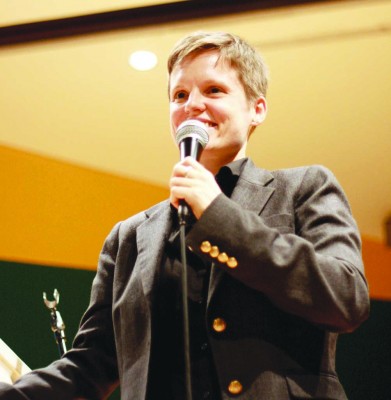
Guest speaker Maggie Bertram spoke to Active Minds about her experience with mental health disorders. (MICHAEL CASHELL/BROADSIDE)
Maggie Bertram was in college not too long ago. She was valedictorian of the small Illinois high school she attended, and she went to college at a small Illinois university.
People knew Bertram as an athlete, intelligent and someone on her way to fulfill the dreams and goals that were laid out for her.
“I came off as ‘put together.’ I was the person people came to when people needed help. I never thought about what I would like to do,” Bertram said.
Bertram and her college friend decided that they had everything in their lives in fairly good order, but they needed one thing to make them truly happy – a man. The pair began exercising and dieting in order to lose weight and attract a guy.
“It felt great to exercise again. It was nice to have that routine, and it was great to have people be like, ‘Hey, you look really great! Have you lost weight?’ and for me to say, ‘Yeah, I have!’” Bertram said. “But because exercise made me feel so much better about myself – gave me confidence – I was starting to exercise more and more and eating less and less. It started to take over my life, where I was constantly thinking about exercising and eating.”
Eventually during Bertram’s college career, she was diagnosed with anxiety, obsessive compulsive disorder, depression and anorexia.
“I would start my assignments for the semester during the first week, and I would work on papers and study until the very last minute,” Bertram said. “But I wasn’t doing well. I would study and study and study, but I couldn’t remember anything. I was too anxious.”
According to the Anxiety and Depression Association of America’s website, “anxiety disorders are one of the most common mental health problems on college campuses. Forty million U.S. adults suffer from an anxiety disorder, and 75 percent of them experience their first episode of anxiety by age 22.”
Bertram joined Active Minds in 2009 and is now the program manager for student-led initiatives at Active Minds, Inc. The organization’s goal is to create discussion that talks differently about mental health. With 420 college campus chapters of Active Minds, the non-profit is making strides to raise awareness about mental health and to remove the term’s negative connotations.
Every year, Mason’s Active Minds chapter holds events and hosts speakers, like Bertram, to talk about college students and dealing with mental health. Though she is not a mental health expert, Bertram has learned over the past few years how to keep her mental health balanced and shares her stories with students struggling with similar problems.
“No one really knows how to respond about what mental health is,” Bertram said. “No one wants to be offensive when they talk about mental health, so people just don’t say anything at all.”
Bertram wants the goals for Active Minds chapters to make some sort of positive change on campus.
“Whether it’s reaching out as a friend to someone who’s stressed, letting someone know about CAPS [Counseling and Psychological Services] or trying to remove the stigma that’s around the phrase ‘mental health,’ I think students can help their peers by making them feel comfortable – not ashamed – with their mental health,” Bertram said. “It’ll never be so easy to get mental health services and support except for when you’re at college.”






Comments